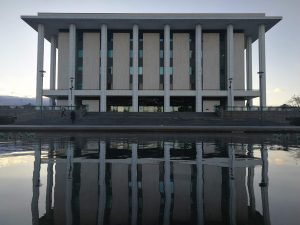Light cast on Howard’s dark victory
 By DANICA FELLOWS
By DANICA FELLOWS
“They put lives at risk. They twisted the law. They drew the military into the heart of an election campaign. They muzzled the press…they closed Australia to refugees – and won a mighty election victory.” (Marr and Wilkinson, 2004)
So runs the blurb for the book ‘Dark Victory’. It is an extraordinary account of the events leading to the 2001 Australian election, and a phenomenal work of investigative journalism. The following is an analysis of this book, and will discuss the outline and themes of the book, the purpose of the book and what it achieved, the newsworthy revelations in the book, discuss the author’s sources for the book, and the issues with publishing, legality and ethics.
‘Dark Victory’ is a book written by David Marr and Marian Wilkinson, both experienced investigative journalists. The book was first published by Allen & Unwin publishers in Australia in 2003, and a second edition in 2004. It has won two awards, including the 2003 Human Rights Award for the Arts Non-fiction category, and the 2003 Queensland Premier’s Literary Awards for Best Literary or Media Work Advancing Public Debate (Marr and Wilkinson, 2004).
The book describes in part how the Howard government won the election in 2001, and in particular the eleven weeks leading up to the election from the Tampa boat crisis, several other boats entering Australian waters, and the ‘children overboard’ affair. It also has a final chapter entitled ‘Aftermath’ that details what happened to the main players in the story after the election was won. The book also revealed the deception and misinformation of the government, as well as highlighted issues of the national perception of ‘boat people’ and how the government played on people’s fears to gain popularity.
The text chronicles various events that happened out at sea, and describes the communications between all the organisations involved in the boat people’s rescue, the Howard Government’s Pacific Solution, as well as the various other actors involved, including details of lawsuits regarding the actions for the government’s legal right to move the boats and ‘protect’ the country’s borders. It also describes the Australian political climate, discussing both Labor and One Nation’s role in the election, which provides an important context for the government’s actions.
The major theme of the book is the control of information (Mares, 2003). Information is controlled concerning the actual conditions of the boat people, which was denied public access, as well as vital legal information, both that should have been available for the asylum seekers and also for the Australian public concerning Australia’s legal obligations to them. Throughout the book, it is demonstrated that Howard is the master of deception, who often manages to deceive without ever really lying (Marr and Wilkinson, 2004).
The conclusions the book makes of the series of incidents regarding Australia’s border protection policy and the Howard government’s use of it to win an election is – while never stated in outright terms – clearly regarded as wrong. Howards’s election speech is contrasted with later statements that completely deny the border protection policies had a hand in his victory, and that he had manipulated Australia’s underlying racial tension to help in this victory (Marr and Wilkinson, 2004).
The control of information is demonstrated continuously by the contrast of eye-witness accounts of what really happened to the asylum seekers with speeches from government Ministers at the time. The process of describing the difference between the situation and what is being said about it lays bare the obvious misrepresentation of the circumstances to the public. In particular, there are points where commentary is added between public comments to assist in deciphering their meaning.
The book’s contents are well summarised in this paragraph.
“John Howard survived all the revelations. He never retreated, never admitted error and just kept talking. As much as his election victory, the stonewalling of the revelations from the Senate gave Howard the appearance of being an unassailable political force in these months. That his government had lied in pursuit of victory was inescapably clear but most Australians forgave him. They liked what Howard had done.” (Marr and Wilkinson, 2004)
I believe the authors wrote this book because they felt it was their job, as journalists, to expose the deception that the government had employed and the laws it flouted in the name of political gain, as well as the terrible cost to human lives their actions might have indirectly caused.
David Marr gave an address at the National Press Club after the release of their book, where he makes a plea to people in government employment, to try and prevent further deception to the Australian public from their own government.
“It is my plea to the Press Club today that if things go wrong in this war, if there are lies being told, leak. And start straightaway the minute there is any sign of trouble. Please, leak.” (National Press Club 2003)
I believe the book accomplished what it set out to do. It explained in great and accurate detail the events that were hidden from the public where the government had gone wrong and kept it hidden. It also explained what the nation’s sentiments were at the time regarding these issues, and how Howard’s control of the media agenda, as well as exploiting people’s fears, kept him popular amongst voters. It laid bare the facts about boat people, gave them humanity that the government denied them, and informed the public so that they may not let this happen again.
The book cover proclaims it was a best-seller, and there is only one slightly negative review of it that I have discovered. This review even then has only one error to record, and goes on to describe the overall merits of the work (Matchett 2003).
As it is a work of investigative journalism, newsworthy revelations of the book include:
• Evidence that the Department of Defence did try to correct the misinformation of children being thrown overboard
• Alexander Downer bullying the Norwegian Ambassador
• Arne Rinnan, captain of the MV Tampa, who had rescued the stranded refugees, being threatened with legal action by the Australian government for people smuggling were he to land the refugees on Christmas Island
• The forced removal of refugees from the HMAS Manoora to Nauru
• That various organizations had knowledge of SIEV-X leaving Indonesia, although the civilian knowledge was considered unreliable by the military and therefore ignored
• The actual conditions of the refugees on the Tampa
For the extensive amounts of detail in the book, the journalists drew from many sources of information, all except first-hand observation, which would have been nearly impossible in this case, given the tight government control at the time. Marr and Wilkinson drew extensively on the Freedom of Information Act to gain information from government sources (Marr and Wilkinson, 2004; Mares, 2003; National Press Club 2003). They also interviewed many insiders from civilian and military organisations, as well asylum seekers from the boats, and all the Norwegians. Where they didn’t interview themselves, they obtained accounts from Amnesty International, and also the biggest revealer of information was the Senate Estimates Committee on a Certain Maritime Incident (Marr and Wilkinson, 2004; Mares, 2003; National Press Club 2003)
Marr also said, and this may hint at the great lengths he and Wilkinson went to, to get information, that, “I have to say I brought engineers in to confirm what had actually happened to the Palapa’s engine,” (National Press Club, 2003). One may infer that the authors dug as much as they could to get information about this story. There is a solid seven pages of ‘Acknowledgements’ that include many names of people they interviewed, but also mention the ones they interviewed but couldn’t name. The book was very thoroughly researched.
The authors commented throughout the book how information was tightly controlled at the time, and with the exception of Admiral Shackleton’s comments that he later amended, there were no leaks.
There were no major legal issues following the publication of this book. All information was gained through publicly available channels, and any comments made are actually defended by the constitution because it is political commentary.
There were ethical issues perhaps in how the journalists represented certain people in this book. While all reporting of the facts was accurate, one article mentioned that the descriptions of the people involved might have been biased (Matchett, 2003). The article noted that the description of Phillip Ruddock was very unfavourable, and revealed the authors’ particular bias against him as a politician.
In summary, the book was an accurate and compelling portrayal of the events leading up to the 2001 election. It was deeply and thoroughly researched and presented in such a way that there could be little doubt about the truth in its words. It is also worth noting that amongst the most important of issues raised in the book, it allowed what the Howard government denied the asylum seekers – a voice.
References
• The Australian (2003, April 19.) One book a week. Retrieved May 24, 2010, from Factiva database.
• Brett, J. (2007) Exit Right: The Unravelling of John Howard [online]. Quarterly Essay, No. 28: 1-96.
• Bowler, M. (2003, May 24) What really happened on the Tampa. Daily News. Retrieved May 24, 2010, from Factiva database.
• Mares, P. (2003) Messing about in boats [Edited version of an interview of David Marr by Mares, Peter conducted at Reader’s Feast bookshop, Melbourne, 2003.] [online]. Meanjin (Melbourne), v.62, no.3, 2003: 6-14. Availability:
• Marr D., and Wilkinson, M. (2004) Dark Victory, Allen & Unwin.
• Matchett, S. (2003, April 5) Rules for refugees go overboard. The Australian. Retrieved May 24, 2010, from Factiva database.
• Murray, A (2003). Dark Victory [Book Review] [online]. Australasian Catholic Record, The, Vol. 80, No. 4, Oct 2003: 529-530.
• National Press Club (2003). ‘David Marr address to the National Press Club on the launch of his book ‘Dark victory’: a detailed account of the Tampa crisis, written with Marian Wilkinson.’ Parliament of Australia, Parlinfo Search.
http://parlinfo.aph.gov.au/parlInfo/search/display/display.w3p;query=Id%3A%22media%2Ftvprog%2F2YT86%22 Accessed: 24/05/2010
• Poynting, S. (2004) Advanced Australian Fear: A Review Essay [Book Review] [online]. Current Issues in Criminal Justice, Vol. 16, No. 2, Nov 2004: 241-252
• SievX.com (2010) “David Marr interviewed by Phillip Adams”
http://sievx.com/articles/challenging/2003/20030310DavidMarr.html Accessed: 24/05/2010
• Wood, D. (2003, March 22) Tampa’s secrets exposed. Hobart Mercury. Retrieved May 24, 2010, from Factiva database.



Be the first to comment!